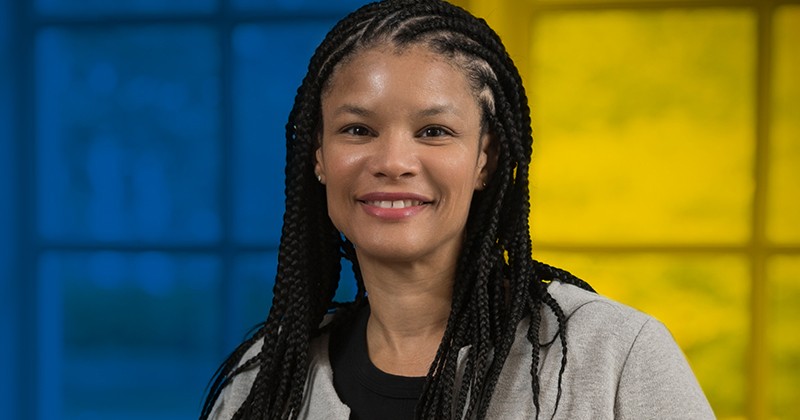LaShanda Korley, Distinguished Associate Professor of Materials Science and Engineering and Chemical and Biomolecular Engineering at the University of Delaware, has been named to the College of Fellows of the American Institute for Medical and Biological Engineering (AIMBE).
Professor named Fellow of American Institute for Medical and Biological Engineering
LaShanda Korley’s lab at the University of Delaware has an unofficial motto: The Korley Lab — where unicorns are real. The fanciful motto represents an undeniable truth. By creating new materials inspired by nature for applications in healthcare, sensing, soft robotics and more, Korley is pushing the boundaries of what materials scientists and engineers previously thought possible.
For outstanding contributions to bio-inspired materials design and manufacturing, Korley, Distinguished Associate Professor of Materials Science and Engineering and Chemical and Biomolecular Engineering at the University of Delaware, has been named to the College of Fellows of the American Institute for Medical and Biological Engineering (AIMBE).
Election to the AIMBE College of Fellows is among the highest professional distinctions accorded to a medical and biological engineer. The College of Fellows consists of the top two percent of medical and biological engineers. Korley is one of 156 new Fellows being inducted in 2020.
“I am extremely honored to be elected to the 2020 Class of AIMBE Fellows,” said Korley. “The recognition by such an esteemed engineering community is particularly important to me, as it highlights the impact and relevance of my research lab’s focus on bio-inspired strategies to develop mechanically-robust and responsive soft material systems with applications from tissue engineering scaffolds to gradient coatings. It also reinforces how blessed I am to have such a talented team of researchers – past and present — in my lab.”
Korley leads a laboratory that focuses on the study of soft matter, polymers and bio-inspired materials — materials with properties like those found in nature. For example, she is designing materials inspired by Mstrong spider silk and by the flexible jaws of sea worms. She is the principal investigator of PIRE: Bio-Inspired Materials and Systems, a five-year, $5.5 million grant from the National Science Foundation.

In a photograph taken before the coronavirus pandemic necessitated social distancing, doctoral student Chase Thompson (left) is mentored by Prof. LaShanda Korley.
She is associate director of the new Center for Research in Soft Matter and Polymers (CRISP) at UD and associate editor of the Journal of Applied Physics. She has published 55 peer-reviewed publications, which have garnered 1,342 citations, according to Google Scholar.
Korley is well recognized as a leader in her field and received the 2019 Lloyd N. Ferguson Young Scientist Award for Excellence in Research from the National Organization for the Professional Advancement of Black Chemists and Chemical Engineers (NOBCChE).
Darrin Pochan, Chair of the Department of Materials Science and Engineering, said: “Professor LaShanda Korley’s deep expertise and prolific research in biomimetic, composite materials for a variety of sustainability and biomedical applications make her a well-deserved candidate for Fellowship in the AIMBE. She is an international leader in the development, processing, and understanding of new polymer materials and soft matter that will have an impact on a wide variety of technology in the future. The Departments of Materials Science and Engineering, Chemical and Biomolecular Engineering, College of Engineering, and UD are proud to call Professor Korley a colleague with all looking forward to many future successes in research, mentorship, and more.”
Eric Furst, Chair of the Department of Chemical and Biomolecular Engineering, said: “LaShanda is a tremendous colleague. I admire her scholarship in soft materials that she pursues with her students, often inspired by nature and natural systems, but I also deeply appreciate her dedication and contributions to the service missions of the college and her departments. Her leadership in activities like Future Faculty Workshop and large center initiatives enrich our community and college research neighborhoods.”
Korley joined UD in 2018 from Case Western Reserve University, where she was the Climo Associate Professor in the Department of Macromolecular Science and Engineering. Korley holds a doctoral degree in chemical engineering, with a focus in polymer science and technology, from the Massachusetts Institute of Technology. She received a bachelor’s degree in both chemistry and engineering from Clark Atlanta University as well as a bachelor’s degree in chemical engineering from the Georgia Institute of Technology.
UD has a strong tradition of biological engineering. Other UD faculty members who belong to AIMBE’s College of Fellows include: Thomas Buchanan, Prasad Dhurjati, Dawn Elliott, Jill Higginson, Kristi Kiick, Kelvin Lee, Abraham Lenhoff, David Martin, Terry Papoutsakis and Millie Sullivan.

